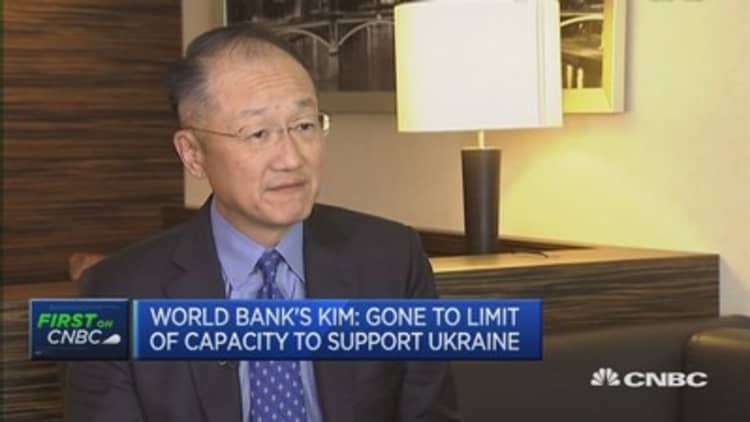Gripped by the prospect of default in Greece? You may be looking in the wrong direction.
The southern European nation may have the world's highest debt burden, equal to 175 per cent of its economy or gross domestic product, but according to credit rating agencies that does not make Greece the riskiest borrower for bond investors.
That title is held by Ukraine, presently engaged in fighting a war with pro-Russian separatists as well as battling creditors over $15bn of debt the country says it cannot afford to service.
The difference between Greece and Ukraine is reflected in the prices at which the sovereign debt of the two countries trades. Prices for Greek bonds have crashed over the past year as investors took fright at the political success of the anti-austerity Syriza party, yet they remain above 50 cents in the euro — considered a benchmark default level. Ukraine's equivalent bonds trade below 50 cents in the dollar, suggesting a far higher risk of a default.
Indeed, this week, Ukraine was declared a "credit event", triggering insurance payouts in the credit derivatives market. According to credit rating agency Standard & Poor's, default is all but certain.

All told, 11 countries, including Greece, are currently at serious risk of defaulting according to global credit rating agency Moody's.
Around the world the euphoric credit boom in emerging markets driven by low interest rates in the US, Europe and Japan now appears vulnerable, piling on the pressure for borrowers.
A weakening trend in EM sovereign credit that began in 2013 has continued this year thanks to the slowdown in Chinese economic growth, weakness in commodity prices and higher US dollar borrowing costs, according to UBS.
The number of countries suffering serious debt imbalances has sharply increased, says Maarten-Jan Bakkum, emerging market strategist at NN Investment Partners. Credit growth used to fund infrastructure projects and provide larger consumer loans was largely funded by years of foreign capital flowing in. Now that tide could be turning, raising fears about what will replace it.
Adding to the sense of discomfort for bond investors is the rise of political instability across many emerging market countries.
Read MoreRussian to Greeks: Look to sovereign wealth funds
"Country risk indicators will continue to deteriorate in the coming months," says Kevin Daly at Aberdeen Asset Management.
Oil-rich Venezuela also eclipses Greece in the likely default risk stakes, with bonds trading at near record low prices as the country resorts to selling gold reserves in order to keep up with repayments. With the economy in the midst of a collapse, the elevated price of insurance against Venezuela failing to make a payment on debt via five-year credit-default swaps, places the odds of non-payment above 50 per cent in the coming year.
Moody's has slashed the country's rating to one notch above Argentina, and as the price of oil, Venezuela's main export, remains well below last summer's peak, the country has found it increasingly difficult to find the reserves to finance its debt.
Elsewhere, Ecuador's return to markets a few years after defaulting was part of the bond boom that distinguished 2014 and has since retreated. After issuing a $2bn bond maturing in 2024, the yield on the bond jumped from 7 per cent to 13 per cent as investors reassessed the risks of repayment in light of falling oil prices.
Argentina has already been pushed into a technical default, after the government refused to comply with a US legal ruling to pay all creditors last year. And the Caribbean island of Grenada recently imposed a 50 per cent haircut on investors holding bonds worth more than $260m following a default in 2013.
More from The Financial Times:
Berlin insists Greek parliament approves all reforms by Monday
Deal or no deal: A breakdown of the latest Greece proposals
Fall in sun's energy will not halt global warming, say scientists
Meanwhile, Puerto Rico's efforts to restructure $72bn of debt is growing ugly as the country's bonds have endured a brutal sell-off as the island tries to unravel its complicated burden of debt.
Hedge funds hold a hefty stake in the debt, buying general-obligation bonds and government-backed bonds in a move that raised hopes that the island had bought time to address its economic problems. Prices for bonds rose to 84 cents on the dollar in early June, the highest point for three months, as the country voted to raise taxes to balance its budget. However, it now faces a series of public agency debt obligations this summer that threaten to push it over the edge in the event that credit lines cannot be extended.
Edward Al-Hussainy at Peridiem puts the island on a list of potential defaults that also includes Angola, which is currently attempting to restructure debt owed to China, a move also being made by Venezuela.
"Whether this new trend is a precursor to sovereign debt distress or buys these governments enough liquidity to weather the capital outflows that will follow the Fed's hikes is unclear," he says.

